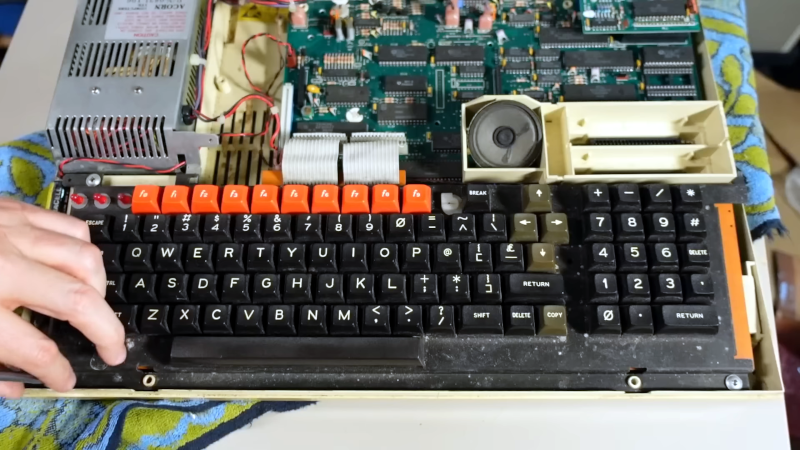[Adrian] comments that the BBC Master 128 is a rare 8-bit computer, and we agree — we couldn’t remember hearing about that particular machine, although the BBC series is quite familiar. The machine has a whopping 128 K of RAM, quite a bit for those days. It also had a 6502 variant known as the 65C12, which has an extra pin compared to a 6502 and doesn’t use the same clock arrangement. A viewer sent him one of these machines, which apparently was used in the BBC studios. You can see this rare beauty in the video below.
The computer has a very nice-looking keyboard that includes a number pad. There are also expansion ports for printers and floppy disk drives. It has some similarities to a standard BBC computer but has a number of differences externally and internally.
Of course, we were waiting for the teardown about 15 minutes in. There were some corroded batteries but luckily, they didn’t do much damage. The power supply had a burned smell. Cracking it open for inspection was a good time to convert the power supply to run on 120 V, too.
After some power supply repair, it was time to power the machine up. The results were not half bad. It started up with a cryptic error message: “This is not a language.” Better than a dead screen. The keyboard wasn’t totally working, though. A bit of internet searching found that the error happens when the battery dies and the machine loses its configuration.
More walkthroughs will take a bit more work on the keyboard. But we were impressed it came up as far as it did, and we look forward to a future installment where the machine fully starts up.
[Adrian] mentioned the co-processor slot accepting a Raspberry Pi, something we’ve talked about before. Or, add an FPGA and make the plucky computer think it is a PDP/11.
















Honestly not that rare, it was mostly built for export to Poland, Czech Republic, Albania and other members of the USSR. It was sold in the so called “behind yellow curtains” shops, and for USD only. One of many ways how those regimes earned hard cash to keep them afloat for so long.
They certainly weren’t mostly built for export.
These were for UK schools.
Not that rare…pretty standard in UK schools in the late ’80s.
Very rare in North America, and they look like really cool machines so also desirable. The one nice thing I got from the video is that for us North Americans the power supply can be easily moded for use with our wimpy 120v mains.
Yeah, these were pretty common in class rooms in all over the UK.
However there was a much rarer model, the BBC Master Compact. Perhaps he’ll do a tear down of that one sometime.
My high school all the way down in Australia had a mix of Masters and Master Compacts, at least before they pivoted to Macs in 1992. I wish I’d asked to keep one…
If you want rare, you want the Olivetti Prodest PC 128 – the Olivetti-branded compact!
The BBC keyboard was the best of any of the 8-bit computers, being designed from the off to cope with constant hammering by kids.
The BBC computers were great. As a college tech in the 80’s, I maintained a couple of labs of them. Solidly built, great keyboards and a built-in rs485 port that allowed the whole room to use one printer.
Great hacking access to the expansion ports too.
The Analogue (IN) was for analogue game controllers / joysticks. I had one and broke the original plastic part of the stick playing Elite. I worked for an injection moulding company and we’d just finished a run of Jaguar roof consoles which looked similar to the Cobra, so I mounted the analogue stick component inside the console, fitted a switch for the fire button and fashioned a base; using a cardboard mould which I then coated the inside with Vaseline, a 5mm thick skin of Isopon P38 and finally some concrete for weight. What a difference it made to gameplay, having the analogue stick inverted and setting the config to match, allowed me to fly the Cobra and always know which position I was in. It improved my game no-end, but sadly not enough to avoid massive hammerings from the Thargons… :)
There was an upgrade, the BBC Master 512.
It added an 80186 CPU and could run CP/M-86 or DOS Plus and GEM.
Thus, turning the Master 128 in a DOS compatible PC.
http://www.cowsarenotpurple.co.uk/bbccomputer/master512/index.html
The National Museum of Computing in Milton Keynes (UK) has a working classroom setup from the 80’s. Well worth a visit if you are passing. https://www.tnmoc.org/classroom